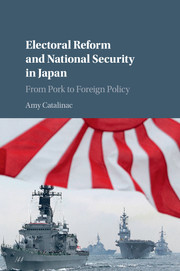Description
Electoral Reform and National Security in Japan
From Pork to Foreign Policy
Author: Catalinac Amy
This book argues that Japanese politicians pay more attention to security issues nowadays because of the electoral reform.
Language: English
Subject for Electoral Reform and National Security in Japan:
Approximative price 30.28 €
In Print (Delivery period: 14 days).
Add to cart
Electoral Reform and National Security in Japan
Publication date: 12-2017
Support: Print on demand
Publication date: 12-2017
Support: Print on demand
Approximative price 101.56 €
In Print (Delivery period: 14 days).
Add to cart
Electoral Reform and National Security in Japan
Publication date: 01-2016
Support: Print on demand
Publication date: 01-2016
Support: Print on demand
Description
/li>Contents
/li>Biography
/li>
Japan is the third-largest economy in the world and a key ally of the United States. Yet the determinants of Japanese security policy are not well understood. The question of why Japan never sought the independent military capabilities that would be commensurate with its economic power has puzzled scholars of international relations for decades. Applying new tools for the quantitative analysis of text to a new collection of 7,497 Japanese-language election manifestos used in elections between 1986 and 2009, this book argues that the electoral strategies politicians in the ruling party were forced to adopt under Japan's old electoral system made it extraordinarily difficult for them to focus on security issues and to change security policy. It was only when their electoral strategies shifted after electoral reform in 1994 that these same politicians became able to pay attention and change security policy.
1. Introduction; 2. Electoral systems, electoral strategies, and national security; 3. Measuring electoral strategies with thousands of candidate election manifestos; 4. Electoral strategies shifted from pork to policy; 5. Electoral strategies shifted to national security; 6. Electoral strategies of opposition focused on policy; 7. Impact on security policy; 8. Conclusion.
Amy Catalinac is a Visiting Assistant Professor of Government at Harvard University, Massachusetts. She earned her Ph.D. in Government from Harvard University in 2011 and was a Postdoctoral Fellow in the Program on US-Japan Relations at Harvard University, as well as an Assistant Professor at Australian National University, Canberra. She has taken ten years of training in the Japanese language and has spent five years in Japan, where she has observed the election campaigns of politicians all over Japan and has conducted more than one hundred interviews with political actors at all levels of the Japanese government. Her earlier research was published in Foreign Policy Analysis, Politics and Policy, Japan Forum and Political Science.
© 2024 LAVOISIER S.A.S.




